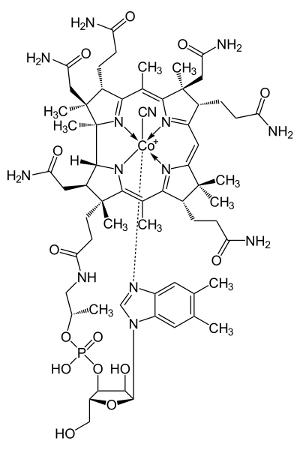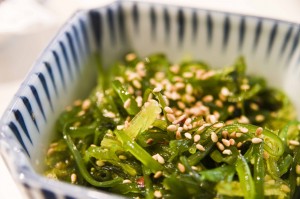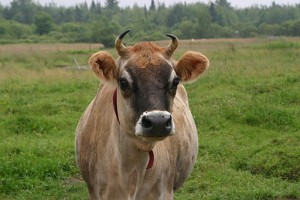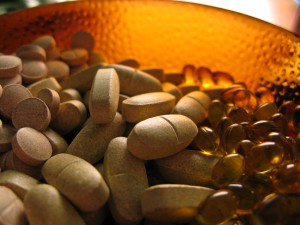Vitamin B12. We’ve all heard about it, but how many of us actually know what it is, and how to get it? What happened to Bs 1 through 11, and why don’t you ever hear about them? Is it true that you can get B12 by eating dirt?
If you’ve ever wondered about any of the above questions, or if you’ve got other questions about the elusive vitamin B12, you’ve come to the right place. As it turns out, vitamin B12 is a very important vitamin that you definitely don’t want to be deficient in. And, unfortunately, it can be a little bit tricky to get if you’re living a raw or vegan lifestyle.
Don’t panic though! In this article, we’ll tell you all about what vitamin B12 is and why you need it, and how you can get it. I’ll just say this right up front: if you eat a vegan or primarily vegan diet, you should take B12 supplements. They’re cheap, easy to find, and you can get them without animal products or weird chemical ingredients. If you’re over 50, vegan or not, you should also seriously consider taking a B12 supplement.
So, I can tell now that you’re intrigued. Now that you’ve got the spoiler, let’s talk about why.
What is Vitamin B12, and What Does It Do?
Vitamin B12, also known as cobalamin, is a critically important vitamin. It is the last in the series of B vitamins, which include riboflavin (B2), niacin (B3) and folic acid (B9). The B vitamins are actually chemically distinct, though they are important in cell metabolism. They are also generally found in the same foods. But B12 is a bit of an outlier.
B12 is involved in all sorts of important biological functions. Things like DNA and RNA production, for example. It’s involved in the metabolism of every cell in your body, and it plays a key role in proper brain and nervous system function.
If that all sounds like a particularly important set of jobs for one little vitamin, that’s because it is. B12 is a whopper. So you might be a little surprised to know that it’s actually pretty rare. Unlike the other Bs, B12 is not found in any plants. In fact, neither plants, animals nor fungi are able to produce vitamin B12.
That only leaves bacteria. That’s right: the only things we know of on earth that can synthesize B12 are certain bacteria and archaea. If you’re a chemistry nerd, you might find it interesting that B12 is considered to be the most chemically complicated vitamin. Just look at this diagram!
 You won’t be tested on that.
You won’t be tested on that.
If you don’t get enough of that whacky chemical in you, you’re liable to face some pretty messed up consequences. Vitamin B12 deficiency can manifest as tingly feelings in the hands or feet, irritability, fatigue, memory loss, or depression. Oh, and those are just the mild symptoms. And you want to catch it when it’s mild, because the serious symptoms include psychosis, dementia, and loss of the sensation of touch (can you imagine?). And it can be permanent.
So that’s the scary part. The good news is it’s actually very easy to avoid deficiency, and in most cases deficiency is easy to correct. The people most at risk of developing a deficiency are vegans and the elderly. People over the age of 50 have difficulty absorbing B12 from animal sources, so even eldery non-vegans should make sure they’re getting supplemental B12. if you’ve been living a vegan lifestyle for more than a couple years and you haven’t been supplementing with B12, it might be worth having your levels tested.
Recommended Dose
As it turns out, you actually only need tiny, tiny amounts of this vitamin. Currently, the U.S Department of Health recommends daily intake of only 2.4 micrograms of B12 per day. While this is on the low side of the recommendations, it’s probably not advisable to regularly take more than double that amount. That’s not a lot, especially considering you can find supplements containing 1000 or even 2000 micrograms per tablet.
That might seem like a Quentin-Tarantino-esque level of overkill. But if you’ve been without a regular source of B12 for a number of years, it’s recommended that you go on a pretty high-dose regimen for at least a couple weeks. As a vegan, if you’ve got stable levels of B12, you’d do well to take a 25-100 microgram supplement each day, or to take 1000 micrograms twice a week. If you’re over 65, you should take more. We’ll talk about other sources of B12 below.
So, if B12 is so important and only some bacteria produce it, you might be wondering why we didn’t all die off before inventing supplements. The answer is that nature is amazing, and the kinds of bacteria that make this stuff live in the digestive systems of us and other animals. So, when we eat other animals or their milk and eggs, we’re actually able to get the B12 we need pretty reliably. The problem is, so many of us don’t want to eat animals or animal products for all kinds of health and moral reasons having nothing to do with B12.
Sources of Vitamin B12
But what if you don’t want to eat animals or animal products, but you also don’t want to take supplements? Well, sadly, you’d be in trouble. Currently, there are no known, verified sources of dietary B12, though there have been a number of suggested candidates. One of the problems is that lots of things which seem to contain B12 actually contain B12 analogues, aka pseudovitamins or inactive B12. These B12 analogues seem like the nutrient we need but can actually serve to lower our uptake of the real thing. For most the non-supplementary sources that have been suggested, there’s still quite a bit of uncertainty whether the food contains active B12 or inactive psuedovitamins.
There have been some hopeful candidates though. Most of these foods are definitely full of beneficial nutrients and make a pretty great addition to any diet, but the jury is still out on whether they are sufficiently reliable sources of B12.
Fermented Foods
Recently there have been some studies on the potential for fermented foods like kimchi to provide the necessary amount of B12. The evidence suggests that elderly people in traditional Korean communities eating quite a lot of fermented vegetable foods can meet their daily B12 requirements, and live to quite old age (up to 108 in the study linked above).
That’s pretty cool, and the logic makes sense. Fermented probiotic foods are all about fostering healthful bacterial cultures in our food, and B12 is synthesized exclusively by bacteria. So, the more fermented foods, the more bacteria, the more B12.
The problem is that there hasn’t been much evidence showing that we can rely on fermented foods. While it may be true that elderly women in Korea have figured it out, that doesn’t mean that we can do the same thing here. In that study, food could be fermented for up to 10 months, and comprised a major part of the women’s diet. This is tempered by the fact that the women in the study above also did consume animal products, though in small amounts.
It is possible that we could get the necessary B12 just from fermented foods, but the evidence for it is lacking. That said, fermented foods are awesome and should definitely be a part of your regular routine. But considering that chronic B12 deficiency can literally cause you to lose your mind, taking supplements is still advised for vegans, even if you’re all over the probiotics.
Seaweed and Nori
Another potentially promising source of B12 is seaweed. Seaweed is well known for containing a broad spectrum of micronutrients, and so is a great health food (and it’s also great for your garden!).  Two types of seaweed in particular have shown promise: nori and dulse.
Two types of seaweed in particular have shown promise: nori and dulse.
Dulse, a type of red seaweed that likes to grow on rocks, has been said to contain more than enough B12 to keep you healthy. However, others disagree.
While some studies do show there to be B12 in dulse in relatively high levels, you should still need to be eating upwards of 3 ounces of seaweed a day, which is a pretty considerable amount. And to make matters worse, it hasn’t been demonstrated whether this apparent B12 are inactive analogues, so we aren’t even sure if eating 3 ounces a day will cover your bases.
Nori doesn’t fare any better. While fresh nori has been shown to contain a lot of potentially active B12, dried nori (which is the only type of nori you’re likely to find) has been shown to contain mostly inactive B12 analogues, and a test group consuming nori was shown to actually suffer a reduction in B12 levels.
Because inactive B12 analogues can actually be harmful in terms of B12 uptake, you shouldn’t rely on seaweed. Seaweed can still be a great source of other nutrients (if you’re careful not to get stuff that is full of weird preservatives and other nastiness), but you should still look towards taking supplements.
Nutritional Yeast
Another potential source of B12 is nutritional yeast. A lot of people have heard that this is the case, and so assume that because they throw yeast in everything, they’ve got nothing to worry about. While it is true that some nutritional yeasts contain B12, that’s only the case if its been fortified to contain B12. Essentially, they just have the supplement built in.
One generally recommended brand for vegans is Red Star Nutritional Yeast, which is designed as a vegan supplement (and makes things taste deliciously cheesish). If your nutritional yeast doesn’t specifically say that it is fortified with B12, then it probably isn’t.
Other Fortified Foods
Nutritional yeast isn’t the only thing that you can buy fortified with vitamin B12. Fortified soymilk isn’t uncommon. Soy-based fake meats also are often B12 fortified, but aren’t really suitable for a raw food diet. Foods fortified with B12 are a pretty reliable source of the essential vitamin. You just have to make sure to be eating it on a regular basis.
Supplements
I know, I’ve been driving at this the whole time and I ruined the climactic ending. The most reliable and easiest way to get B12 is to take a supplement. The most popular reliable supplements are made from cyanocobalamin, an artificially produced form of B12. It is produced through a bacterial fermentation process involving a whole bunch of different microbes, and has been granted GRAS status by the USDA (which means Generally Regarded As Safe).
While regarded as safe, cyanocobalamin does contain cyanide which some consider a bit freaky. An alternative which does not contain cyanide is methylcobalamin. These supplements are readily available in vegan formulations. Mine are wheat free, gluten free, nut free and soybean free, and the ingredients are mostly plant-based. They might not be completely natural, but hey, neither are blenders.
But What if You Want to Get B12 Naturally? Other Animals Do It!
Sure, horses and elephants don’t eat other horses and elephants and they don’t all seem depressed. So what gives? Well, horses and elephants are different than humans. Humans, it seems, evolved eating other animals, as well as bugs and stuff, which are great sources of B12. Of course, that doesn’t meant that we should keep doing that, but it places certain biological limitations on us.
For example, cows famously have four stomachs. That allows them to do things which we can’t, including the ability to rely on their internal bacteria to provide them with enough B12. As an added bonus, cows also eat where they poop. It turns out that eating your own poop is maybe the only truly natural vegan way to get your B12, since organisms in your digestive tract produce it, and they get pooped out. You know the rest.
Before you start thinking mean things about cows, consider the fact that rodents like rats and cute fluffy bunny rabbits will regularly eat their own pellets to get nutrients they otherwise couldn’t find, including vitamin B12.
But what about that old saying about eating dirt? Well, there might be some truth to it. Luckily for every other creature on earth, elephants are pretty strict vegans. So how do they get vitamin B12? Part of the explanation seems to be that they tend to eat a lot of dirt.
And what about our relatives, the apes? Many of them are quite vegetarian, and they don’t need supplements. This is true. Even the mighty gorillas don’t eat much in the way of eggs or meat. But they do eat bugs. Actually, so do lots and lots of humans. But here, it’s fallen out of favor, although there are some interesting companies trying to bring it back.
Most vegans probably wouldn’t be interested in eating bugs, though I am told they aren’t bad raw. But if eating bugs, dirt, or worse isn’t your thing, the best strategy is probably to go get yourself a jar of vegan-friendly B12 supplements.
–


what about getting b12 shots